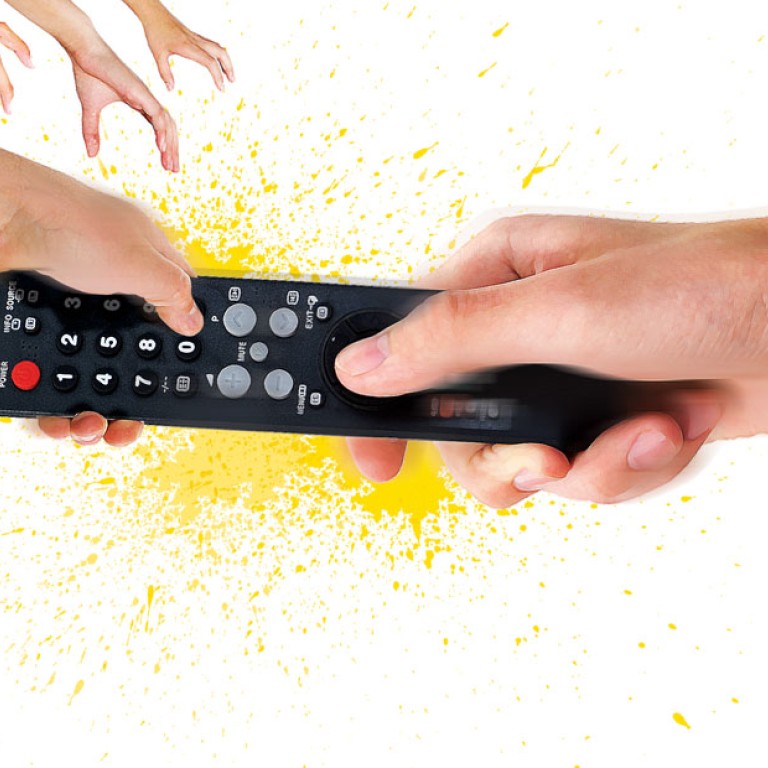
What government says of TV licence decision, and Ricky Wong's response
The government yesterday provided its most detailed explanation of why it awarded free-to-air TV licences to subsidiaries of iCable and PCCW. Ricky Wong Wai-kay, boss of HKTV, which was not given a licence, then hit back
Listed below are the main criteria put forward by the government for its decision and Wong's response:
Financial capability
Government:
The applicants' or their parent companies' market capitalisation and profitability, cash flows, asset-to-liability ratio and financial support to be rendered to each applicant.
Wong:
Hong Kong Television Network: HK$3.7 billion profit and HK$2.3 billion net cash and assets, according to its 2012 annual report; HK$8 million loss as of 2013 interim report;
Fantastic TV: HK$278 million losses as of its 2012 annual report; HK$112 million loss and HK$56 million net cash, according to its 2013 interim report of parent company iCable Communications
Hong Kong Television Entertainment Network: HK$2.6 billion profit as of 2012 annual report; HK$1.5 billion profit and HK$21.2 billion net cash deficit in 2013 interim report of HKTVE's parent firm PCCW
Investment in programming
Government:
Self-produced, first-run programming, as well as non-programming operating costs
Wong:
HKTV: HK$1.1 billion in first six years
FTV: HK$968 million in first six years
HKTVE: HK$1.3 billion in first six years
Programming strategy
Government:
Includes programme diversity, the mass appeal of programmes, experience in operating paid TV service, capability in content production and audience ratio of the parent companies. This criterion covers all types of programming and is not limited to dramas.
Wong:
HKTV: nine types of programmes including current affairs, entertainment, arts and culture, local dramas and purchased programmes; one Chinese channel, one English channel and 28 licensed channels; 200 hours of locally produced drama and infotainment programmes and 800 hours of purchased programmes
FTV: seven types of programmes including news, business and entertainment, but no drama series; one Chinese channel and one English channel
HKTVE: 10 types of programmes including news, current affairs and lifestyle, excluding drama series; one Chinese channel and one English channel
Technical capabilities
Government:
The transmission arrangement proposed by the applicants, expected service coverage, and technology supporting high definition and interactive television.
Wong:
HKTV: 93 per cent residential coverage, full coverage within first five years
FTV: 95 per cent residential coverage
HKTVE: 90 per cent residential coverage
Additional criteria used to weigh the three applications
Government:
The recommendation of the Broadcasting Authority [now Communications Authority]; the applicable statutory requirements under the Broadcasting Ordinance; the assessment criteria in the Authority's "Guidance note for those interested in applying for domestic free television programme service licences in Hong Kong"; sustainability of the free-TV market; the consultant's reports on the impact of new competitors on the free-TV market, including the consultant's assessment of the relative competitiveness of each applicant; all representations/responses by relevant parties, all public views received; the government's prevailing broadcasting policy; and public interest.
Wong:
"According to media reports, a consultancy report submitted to the [Chief Executive] in Council on July 13 recommended that three licences be granted to the three applicants. HKTV is not the weakest applicant of the three.
"TVB's group general manager Mark Lee Po-on said advertising revenue did not show a significant increase in the past 16 years. But Cecilia Yau, PWC's Hong Kong entertainment and media partner, pointed out that the compound annual growth rate for TV advertising will reach 8.5 per cent in the coming five years.
" According to HKU public opinion programme surveys conducted in May and June, more than 80 per cent of respondents supported the granting of new free-to-air TV licences, 63 per cent agreed a licence should be granted to HKTV, 50 per cent supported FTV and 52 per cent supported HKTVE.
"The 1998 television policy stipulated that there's no cap on free-to-air TV licences."
Gradual and orderly approach in introducing competition
Government:
"A gradual and orderly approach should be adopted … to prevent an adverse impact brought about by a sharp increase in the number of free-TV operators, for example a decline in programme quality as a result of cutthroat competition … The consultant's findings indicated that the market would be able to sustain the operation of three operators (including the two existing licensees), and perhaps four operators under favourable market conditions.
"Five players are hardly sustainable in the consultant's point of view. The Chief Executive in Council [felt] the sustainable … development of the free-TV market was an important consideration."
Wong:
"Only a handful of Exco members have solid business experience. No one has any experience in the TV industry. How can any of the Exco members be capable of making decisions that contradict the consultancy reports conducted by experts? The reports also said that [Hong Kong's TV market] is very dynamic" and is expected to grow with more players.

